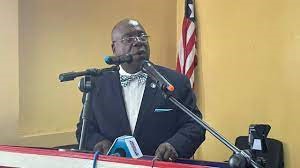PHOTO: Dr. Edward Wonkeryor, NCHE boss
Reports Kay Mantoh
The Director General of the National Commission on Higher Education (NCHE), Professor Dr. Edward Lama Wonkeryor, is seeking ministerial status for the commission, as he assures Liberians of his determination to transforming the country’s higher education system on par with others internationally.
He vowed to make the NCHE competitive in the West African sub-region and the entire African continent. To begin this drive, the commission has begun a vigorous campaign towards the verification of credentials of lecturers, management and staff of Higher Education Institutions to be launched.
The National commission on higher education (NCHE) is the statutory arm of the Liberian Government charged with regulation and accreditation of higher education institutions in the country.
In a bid to successfully achieving this transformative milestone in the history of the institution, NCHE has put into place some key strategies including development of an activity work plan which articulates strategic objectives with the aim of holistically transforming the higher educational system of the country.
Some of the key strategies, according to the NCHE boss, include delivery of quality and competitive education output for sustainable national development. To achieve this objective, the commission has launched a vigorous campaign towards the verification of credentials of staff within the higher education sector, with major focus on lecturers and management staff of Higher Education Institutions (HEIs) in the country.
According to DG Wonkeryor, weeding out bogus and substandard institutions from the list of higher education institutions in the country is another key venture by the commission under his watch. He describes this as very important in the process of battling the prevalence of quack colleges and universities that are regularly creeping at all levels of the Liberian society, with some offering Masters degrees and even PhDs.
“Our Quality Assurance Department has already commenced a vigorous campaign to identify and locate such institutions for the appropriate actions,” he told a Reporters recently.
Professor Dr. Wonkeryor recently addressed the regular Tuesday Press Briefing at the Ministry of Information Culture Affairs and Tourism (MICAT) on Capitol Hill in Monrovia.
According to the NCHE Director General, the commission is building and upgrading its statutory capacity for effective performance. He said the entity’s analysis and observation of past and current realities points to the need for elevating the commission to a ministerial status preferably to be called the ‘Ministry of Higher and Technical Education’ in order to achieve its herculean mandates.
“International best practices also confirm that the regulatory agency requires a cabinet status to enable the management to be present and discuss cardinal policy matters at the cabinet level where the head of state is present and presiding,” Dr. Wonkeryor explained.
The NCHE Director General also disclosed that as part of the campaign towards delivering transformation at the commission, the entity has made a request to the Embassy of the Republic of China in Liberia for assistance to construct a modern office building for the commission. Additionally, the commission has also engaged the University of Liberia for a parcel of land to be hosted on the UL’s Fendell facility for this purpose.
The proposed project will see the construction of a modernized headquarters from whence the NCHE will adequately and passionately coordinate and administer the activities of the higher education sector of Liberia.
However, the attainment of these attractive objectives is being seriously challenged by inadequate budgetary support from the Government of Liberia, according to Dr. Workeryor.
“It is astonishing to hear that the NCHE has only an annual budget of a little over $300,000.00USD, covering salaries, goods, and services,” he added.
Key challenges confronting the commission currently have been outlined, including dismal budgetary appropriation, shortage of logistics, especially vehicles, to facilitate crucial activities such as monitoring and evaluation and the conduct of the institutional assessments, which are crucial towards ensuring compliance with established standards by HEIs in the country.
Dr. Wonkeryor also named limited human resources capacity as an issue of serious concern, stressing that the NCHE currently has a total of 29 employees including senior staff. This, he said, points to the inadequacy of manpower to handle phenomenal tasks of managing and supervising the huge higher education sector of Liberia. Another challenge he named was limited or inadequate clerical equipment, especially laptop computers and printers, and also the lack of training opportunities to build the capacity of staff to cope with contemporary higher educational systems demands.
The NCHE was established by an act of the Legislature in 1989 to regulate, manage, and monitor higher education institutions (HEIs).
In Liberia, higher education institutions are grouped into three categories by credentials, including a. Master’s Degree granting institutions, totaling nine (9), b. Bachelor’s Degree granting institutions, totaling twenty-one (21), and, c. Associate Degree granting institutions, totaling twenty-four (24).
The institutions are further classified into public (11), private (19), and faith-based (24) by their ownership. These institutions are distributed across ten counties across Liberia, including Bomi, Bong, Grand Bassa, Grand Gedeh, Lofa, Margibi, Montserrado, Nimba and Sinoe Counties.

